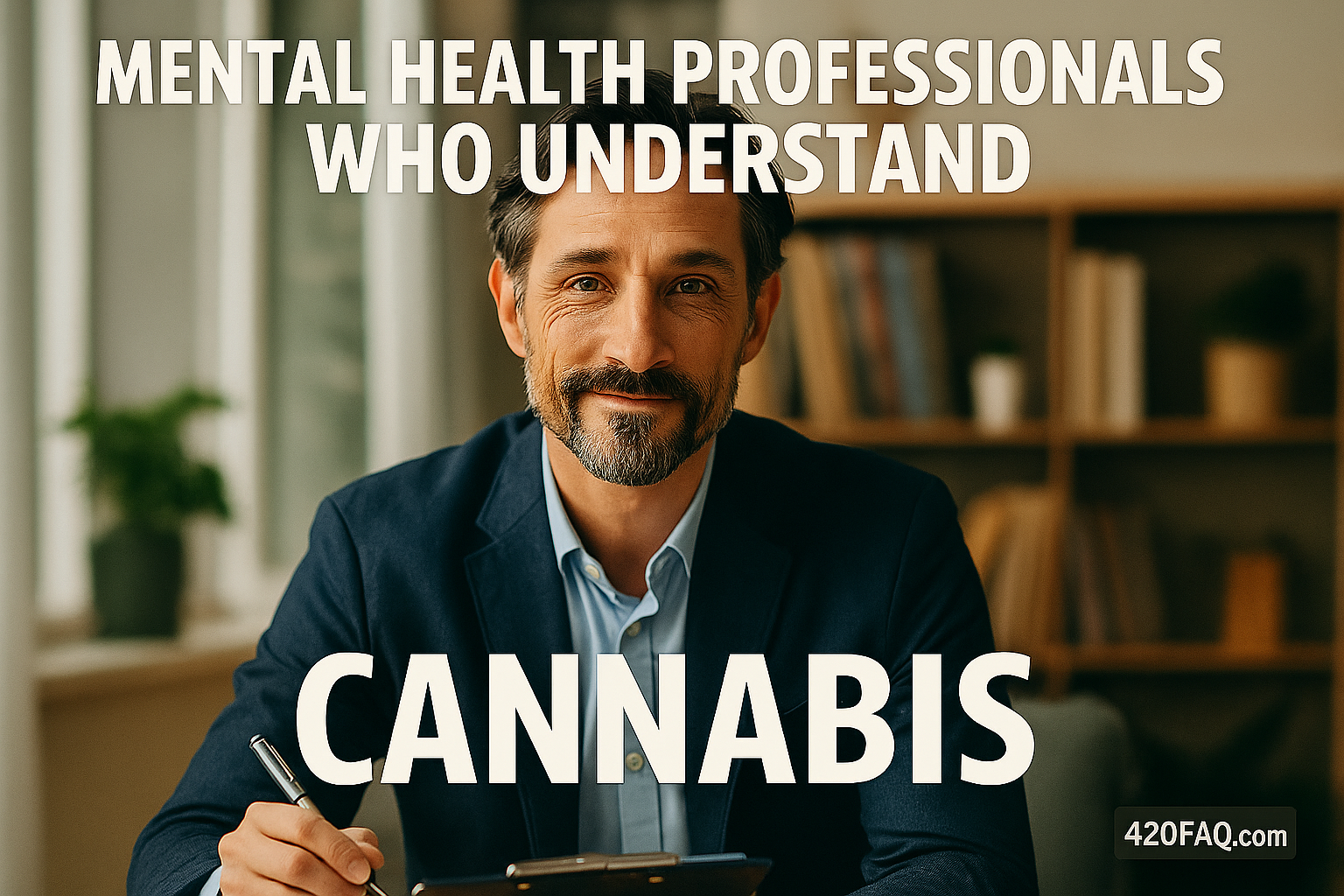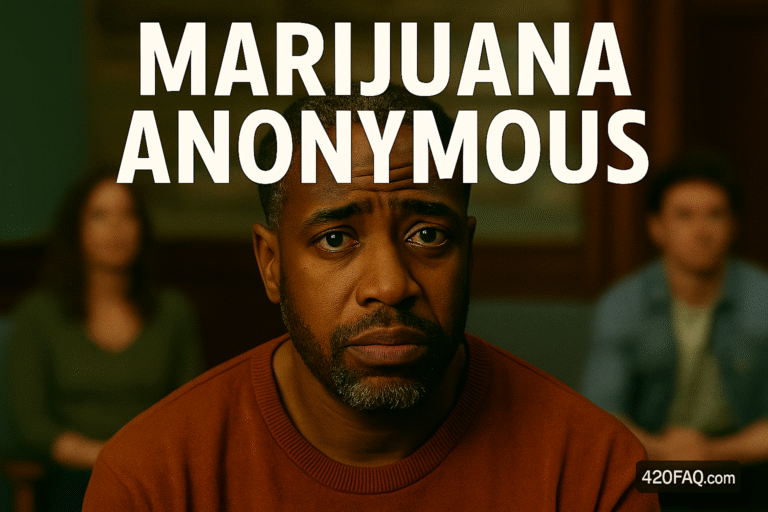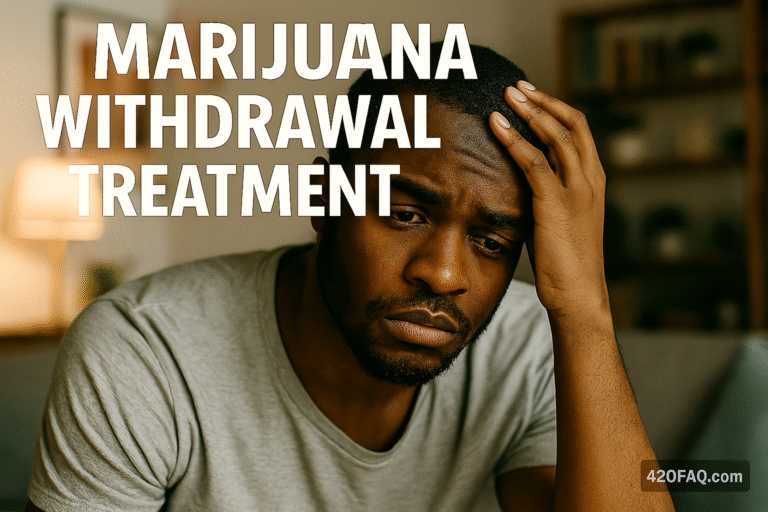
Mental Health Professionals Who Understand Cannabis: Finding Expert Care in the Modern Era
The intersection of mental health treatment and cannabis use has become increasingly complex as both medical marijuana and recreational cannabis gain legal acceptance across the United States. Finding mental health professionals who truly understand cannabis—its therapeutic potential, its risks, and its role in comprehensive mental health care—is crucial for millions of Americans who use cannabis while managing mental health conditions. This guide explores how to identify and work with mental health professionals who possess genuine cannabis knowledge and expertise.
The Importance of Cannabis-Knowledgeable Mental Health Care
Mental health professionals who understand cannabis bring a unique combination of clinical expertise and substance knowledge that can dramatically improve treatment outcomes. Unlike practitioners who simply tolerate cannabis use, these professionals understand the endocannabinoid system, different cannabis compounds and their effects, potential therapeutic applications, and how cannabis interacts with various mental health conditions.
This understanding extends beyond basic tolerance to include knowledge of dosing strategies, strain differences, consumption methods, and how cannabis use patterns may impact various psychiatric medications. Mental health professionals with cannabis expertise can provide guidance that enhances both safety and therapeutic effectiveness while avoiding the pitfalls of uninformed advice or blanket prohibitions.
The difference between cannabis-tolerant and cannabis-knowledgeable mental health professionals is significant. While a cannabis-friendly therapist won’t judge your use, a cannabis-knowledgeable professional can actively help you optimize your cannabis use as part of a comprehensive mental health strategy, identify potential problems early, and integrate cannabis considerations into evidence-based treatment approaches.
Educational Background and Training of Cannabis-Knowledgeable Professionals
Mental health professionals who understand cannabis typically have sought additional education beyond their standard clinical training. Many have completed continuing education courses focused on cannabis medicine, attended conferences on psychedelic and cannabis therapeutics, or pursued certifications in medical marijuana patient care.
Some professionals have completed formal training programs such as those offered by the American Cannabis Nurses Association, the Society of Cannabis Clinicians, or specialized courses through organizations like Green Flower Media or Trichome Institute. These programs provide comprehensive education on cannabis pharmacology, therapeutic applications, and patient care considerations.
Research-oriented mental health professionals may have cannabis knowledge gained through academic study or clinical research participation. Psychologists and psychiatrists involved in cannabis research studies often develop deep understanding of cannabis effects, therapeutic potential, and clinical applications that inform their practice with all patients.
Medical professionals with dual training in psychiatry and addiction medicine often possess comprehensive cannabis knowledge, understanding both therapeutic applications and potential for problematic use. These professionals can navigate complex situations where cannabis may be both helpful and potentially concerning.
Psychiatrists with Cannabis Expertise
Psychiatrists who understand cannabis represent a particularly valuable resource because they can prescribe psychiatric medications while understanding potential cannabis interactions. These medical doctors have completed specialized training in mental health conditions and often have additional knowledge about cannabis pharmacology and therapeutic effects.
Cannabis-knowledgeable psychiatrists understand how different cannabis compounds affect neurotransmitter systems involved in mental health conditions. They can advise patients about potential interactions between cannabis and psychiatric medications, help optimize timing of cannabis use relative to medication schedules, and adjust psychiatric treatments based on cannabis use patterns.
Many psychiatrists with cannabis expertise have experience working with medical marijuana patients and understand the complexities of treating conditions like PTSD, anxiety disorders, and treatment-resistant depression in patients who use cannabis therapeutically. They can distinguish between cannabis use that supports mental health goals and use patterns that may interfere with treatment.
Some psychiatrists specialize in cannabis medicine and maintain practices focused specifically on medical marijuana patients. These specialists often have the most comprehensive cannabis knowledge and can provide expert guidance on cannabis selection, dosing, and integration with traditional psychiatric treatments.
Psychologists with Cannabis Knowledge
Psychologists who understand cannabis bring valuable perspectives on the psychological and behavioral aspects of cannabis use while understanding its therapeutic potential. These professionals often have training in substance use psychology, behavioral medicine, or health psychology that includes cannabis-specific knowledge.
Cannabis-knowledgeable psychologists can conduct comprehensive assessments that include detailed cannabis use history, understand how cannabis affects cognitive function and emotional regulation, and develop treatment plans that account for cannabis use patterns. They often use evidence-based approaches like Cognitive Behavioral Therapy or Acceptance and Commitment Therapy adapted for clients who use cannabis.
Neuropsychologists with cannabis expertise understand how cannabis affects cognitive function, memory, and attention. This knowledge is particularly valuable for patients with conditions like ADHD, traumatic brain injury, or neurodegenerative diseases who may be using cannabis therapeutically.
Research psychologists involved in cannabis studies often have cutting-edge knowledge about cannabis effects on mental health conditions. They may be aware of emerging research findings and novel therapeutic applications before they become widely known in clinical practice.
Licensed Clinical Social Workers and Cannabis
Licensed Clinical Social Workers (LCSWs) with cannabis knowledge often approach cannabis use from a social justice and harm reduction perspective while understanding therapeutic applications. These professionals frequently work with diverse populations and understand how cannabis use intersects with various social, cultural, and economic factors.
Cannabis-knowledgeable LCSWs often have training in trauma-informed care and understand how cannabis may be used to self-medicate trauma symptoms. They can help clients develop healthy coping strategies that may include cannabis use as one component of a comprehensive wellness plan.
Many LCSWs with cannabis expertise work in community mental health settings and have experience helping clients navigate legal, employment, and housing issues related to cannabis use. This practical knowledge complements their clinical skills and therapeutic understanding.
Social workers specializing in addiction treatment may have advanced cannabis knowledge and can help clients who are struggling with problematic cannabis use while understanding the difference between therapeutic use and cannabis use disorder.
Licensed Professional Counselors and Cannabis Understanding
Licensed Professional Counselors (LPCs) and Licensed Mental Health Counselors (LMHCs) with cannabis knowledge often specialize in specific areas like anxiety treatment, trauma therapy, or couples counseling while understanding how cannabis factors into these issues.
Cannabis-knowledgeable counselors often use integrative approaches that combine traditional therapeutic modalities with understanding of cannabis effects and therapeutic potential. They may incorporate mindfulness-based interventions, somatic therapies, or expressive therapies that complement cannabis use for certain clients.
Many counselors with cannabis expertise have personal or family experience with cannabis use and have sought professional education to enhance their clinical understanding. This combination of lived experience and professional knowledge can create particularly effective therapeutic relationships.
Specialized counselors may focus on specific populations such as veterans using cannabis for PTSD, chronic pain patients using medical marijuana, or individuals in states transitioning to cannabis legalization who need guidance on legal and therapeutic use.
Identifying Cannabis-Knowledgeable Mental Health Professionals
Finding mental health professionals with genuine cannabis knowledge requires asking specific questions about their education, experience, and approach to cannabis-related issues. Unlike simply finding cannabis-friendly professionals, identifying those with real expertise requires deeper inquiry.
Ask potential providers about their specific cannabis education and training. Professionals with genuine cannabis knowledge can usually describe specific courses, conferences, certifications, or research experience that inform their practice. They should be able to discuss cannabis pharmacology, different consumption methods, and therapeutic applications with confidence and specificity.
Inquire about their experience working with medical marijuana patients or clients who use cannabis therapeutically. Cannabis-knowledgeable professionals should be able to describe their approach to different mental health conditions in cannabis-using populations and explain how they integrate cannabis considerations into treatment planning.
Ask about their understanding of cannabis research and evidence base. Knowledgeable professionals should be familiar with current research on cannabis and mental health, understand the limitations of existing studies, and be able to explain how research findings inform their clinical practice.
Professional Organizations and Resources
Several professional organizations focus on cannabis medicine and can help identify knowledgeable mental health professionals. The Society of Cannabis Clinicians maintains a directory of healthcare providers with cannabis expertise, including mental health professionals.
The American Cannabis Nurses Association provides education and certification for healthcare professionals working with cannabis patients, and their members often include mental health nurses and nurse practitioners with specialized cannabis knowledge.
Local medical cannabis advocacy organizations often maintain referral networks of knowledgeable healthcare providers, including mental health professionals who understand cannabis therapeutics and can provide expert care.
Professional conferences on cannabis medicine, such as those hosted by Patients Out of Time or the Cannabis Health Summit, often feature mental health professionals with cannabis expertise and can be good venues for finding qualified providers.
What Cannabis-Knowledgeable Professionals Should Know
Mental health professionals with genuine cannabis understanding should possess knowledge across several key areas that go far beyond basic tolerance or acceptance of cannabis use.
They should understand the endocannabinoid system and how different cannabis compounds (THC, CBD, minor cannabinoids, and terpenes) affect mental health conditions. This includes knowledge of how different ratios and combinations of compounds may be therapeutic for specific conditions.
Knowledgeable professionals should understand various consumption methods and their different onset times, duration of effects, and therapeutic applications. They should be able to discuss the pros and cons of smoking, vaping, edibles, tinctures, and topical applications for different mental health goals.
They should be familiar with current research on cannabis and mental health conditions including anxiety disorders, depression, PTSD, bipolar disorder, ADHD, and others. They should understand both potential benefits and risks associated with cannabis use for different conditions.
Cannabis-knowledgeable professionals should understand dosing principles including microdosing, tolerance development, and strategies for optimizing therapeutic effects while minimizing side effects. They should be able to help clients develop rational approaches to cannabis use that support their mental health goals.
Integrating Cannabis Knowledge into Mental Health Treatment
Mental health professionals who understand cannabis can integrate this knowledge into evidence-based treatment approaches in ways that enhance rather than replace traditional therapeutic interventions. This integration requires sophisticated understanding of both cannabis effects and clinical practice.
Cannabis-knowledgeable therapists might help clients optimize the timing of cannabis use relative to therapy sessions, understanding how different cannabis effects might enhance or interfere with therapeutic processes. They can help clients use cannabis mindfully as part of homework assignments or between-session coping strategies.
These professionals can provide psychoeducation about cannabis effects on mood, anxiety, sleep, and cognition that helps clients make informed decisions about their use. They understand how cannabis might interact with therapy homework, meditation practices, or other therapeutic activities.
Knowledgeable professionals can help clients distinguish between therapeutic cannabis use and problematic use patterns, providing guidance on healthy use practices while avoiding unnecessary abstinence requirements that might interfere with treatment engagement.
Specializations Within Cannabis-Knowledgeable Mental Health Care
Some mental health professionals develop particular expertise in specific areas of cannabis and mental health intersection, becoming specialists within this emerging field.
PTSD specialists with cannabis knowledge understand how cannabis affects trauma symptoms, sleep disturbances, and hypervigilance. They can help veterans and trauma survivors optimize cannabis use for symptom management while engaging in trauma-focused therapy.
Anxiety specialists who understand cannabis can help clients navigate the complex relationship between cannabis and anxiety, understanding how different strains and dosing strategies may help or hinder anxiety management goals.
Chronic pain psychologists with cannabis expertise understand the intersection of pain, mental health, and cannabis use. They can help clients develop comprehensive pain management strategies that include appropriate cannabis use alongside psychological interventions.
Addiction specialists with cannabis knowledge can distinguish between therapeutic cannabis use and cannabis use disorder, providing appropriate interventions that respect the therapeutic potential of cannabis while addressing problematic use patterns.
Working with Cannabis-Knowledgeable Professionals
Maximizing the benefits of working with cannabis-knowledgeable mental health professionals requires active engagement and honest communication about your cannabis use, goals, and experiences.
Be prepared to provide detailed information about your cannabis use patterns including frequency, dosing, strains used, consumption methods, and effects experienced. Cannabis-knowledgeable professionals can use this information to provide specific guidance and recommendations.
Come prepared with questions about how cannabis might interact with your mental health treatment goals. These professionals can provide evidence-based information about potential benefits and risks specific to your situation.
Be open to modifying your cannabis use based on professional guidance. Cannabis-knowledgeable professionals may suggest changes to your use patterns, timing, or methods that could enhance your mental health outcomes.
Keep detailed records of your cannabis use and mental health symptoms to share with your provider. This information helps cannabis-knowledgeable professionals track the relationship between your use patterns and therapeutic outcomes.
Telehealth and Cannabis-Knowledgeable Mental Health Care
The expansion of telehealth services has made cannabis-knowledgeable mental health professionals more accessible to people in areas where such specialists may not be available locally. Many experts in cannabis and mental health now offer remote services.
When seeking telehealth services from cannabis-knowledgeable professionals, ensure they are licensed to practice in your state and understand the legal landscape for cannabis use in your location. Different state laws may affect their ability to provide certain types of guidance.
Telehealth can be particularly beneficial for accessing specialists with specific cannabis expertise who may not be available in your geographic area. This includes professionals who specialize in specific conditions or populations that require particular cannabis knowledge.
Future Directions in Cannabis-Knowledgeable Mental Health Care
As research on cannabis and mental health continues to expand, mental health professionals with cannabis expertise are increasingly important for translating new findings into clinical practice. These professionals serve as bridges between emerging research and practical patient care.
Professional education programs are beginning to include cannabis education as part of standard mental health training, which should increase the availability of knowledgeable professionals over time. However, currently, professionals with specialized cannabis knowledge remain relatively rare and valuable.
The integration of cannabis medicine into mainstream healthcare is creating new opportunities for mental health professionals to develop cannabis expertise and offer specialized services to populations who use cannabis therapeutically.
Conclusion
Mental health professionals who understand cannabis represent a crucial resource for the growing number of people who use cannabis while managing mental health conditions. These professionals combine clinical expertise with specialized cannabis knowledge to provide comprehensive, evidence-based care that optimizes both mental health outcomes and cannabis use safety and effectiveness.
Finding truly cannabis-knowledgeable mental health professionals requires asking specific questions about education, training, and experience rather than simply seeking cannabis-tolerant providers. The investment in finding the right professional can lead to more effective treatment, better cannabis use outcomes, and improved overall mental health and wellness.
As the field continues to evolve, mental health professionals with cannabis expertise will play increasingly important roles in helping individuals navigate the complex relationships between cannabis use and mental health treatment. Their specialized knowledge bridges the gap between traditional mental health care and the realities of cannabis use in modern society.





